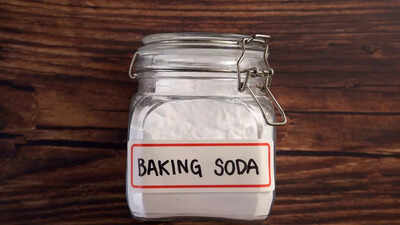ARTICLE AD BOX

Baking soda, a common household ingredient, has recently gained attention for its potential health benefits. From easing digestive discomfort to enhancing exercise performance, many people are turning to baking soda water as a simple, at-home remedy.
Its alkaline properties allow it to neutralize stomach acid, while some studies suggest it may help buffer muscle acidity during intense workouts. However, despite these potential advantages, excessive or improper use can pose serious health risks, including high sodium intake and metabolic alkalosis. Understanding how baking soda interacts with the body is essential before adding it to your daily routine.
How the body is equipped to handle baking soda and maintain pH balance
Baking soda, scientifically known as sodium bicarbonate, is an alkaline compound made up of sodium, hydrogen, carbon, and oxygen. Its primary function is neutralizing acids, which is why it is widely used in antacids for heartburn and indigestion. When dissolved in water, it increases the solution’s alkalinity, leading many to believe that it can help balance the body’s pH levels.However, the human body is naturally equipped to maintain a precise pH balance.
Blood pH, for instance, is tightly regulated between 7.35 and 7.45. Altering this balance through excessive baking soda intake can lead to metabolic alkalosis, a condition in which blood becomes dangerously alkaline, potentially causing muscle twitching, confusion, and heart rhythm disturbances. While occasional use may neutralize stomach acid temporarily, regular consumption can disrupt the body’s finely tuned systems.
Health benefits of baking soda water: From athletic performance to digestion
- Enhances athletic performance: According to a study published in BMC, baking soda can help neutralize the buildup of acidity in muscles that occurs during intense exercise. This reduces fatigue, allowing athletes to maintain higher intensity and perform longer without tiring quickly.
- Supports endurance activities: Consuming baking soda before workouts may improve performance in activities like running, cycling, and rowing. Proper timing and dosage are essential, as too much can lead to discomfort rather than benefits.
- Eases digestive discomfort: The alkaline nature of baking soda helps neutralize excess stomach acid, providing temporary relief from heartburn, sour stomach, and indigestion.
- Reduces bloating and gas: By helping restore a balanced pH in the digestive tract, baking soda can improve digestion, allowing food to break down more efficiently and reducing feelings of bloating or gas.
- May support kidney function: Moderate use of baking soda can help regulate pH levels in the body, which may assist kidney health, improve nutrient absorption, and support overall bodily balance.
- Caution is needed: Overuse can cause gastrointestinal issues such as bloating, nausea, or diarrhea, potentially negating the positive effects, especially for athletes or those with sensitive digestion.
Health risks of excessive baking soda water consumption
Despite these potential benefits, baking soda carries significant risks when used excessively. One teaspoon contains more than 1,200 milligrams of sodium, approximately 80% of the recommended daily limit. High sodium intake is associated with hypertension, heart disease, and stroke, making routine consumption of baking soda water risky, especially for individuals with existing cardiovascular conditions.Moreover, chronic use or large doses can trigger metabolic alkalosis, which may disrupt normal bodily functions and lead to serious health complications. Baking soda can also interact with medications, potentially diminishing their effectiveness or causing harmful side effects. Individuals taking treatments for high blood pressure, kidney disease, or heart failure should avoid unsupervised use.
Safe use of baking soda water
Health professionals emphasize that baking soda should be used cautiously and sparingly.
There is no universal dosage suitable for everyone, and what benefits one person may harm another. For occasional heartburn relief, a small amount, such as ¼ teaspoon dissolved in water, may be sufficient. Performance-focused athletes should also approach use with caution, carefully monitoring dosage and timing to avoid adverse gastrointestinal effects.Ultimately, while baking soda water offers some legitimate benefits, it is not a miracle solution.
Understanding the science behind its effects and consulting a healthcare provider before use is crucial to prevent potentially serious health issues. Like many natural remedies, moderation and informed application are key to safely reaping any advantages baking soda may provide.Disclaimer: This article is for general informational purposes only and is not a substitute for professional medical advice, diagnosis, or treatment. Always seek the guidance of a qualified healthcare provider regarding any medical condition or lifestyle change.Also Read: Early signs of blocked arteries in teens and how to prevent heart attack risk



.png)
.png)
.png)
















 2 hours ago
4
2 hours ago
4







 English (US) ·
English (US) ·